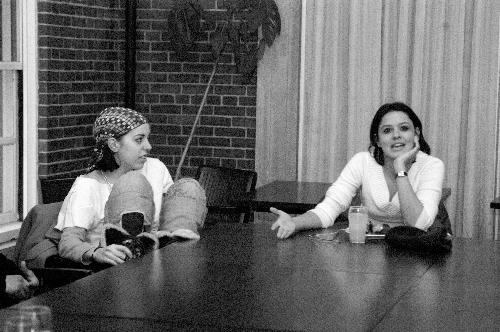
News
Summers Will Not Finish Semester of Teaching as Harvard Investigates Epstein Ties

News
Harvard College Students Report Favoring Divestment from Israel in HUA Survey

News
‘He Should Resign’: Harvard Undergrads Take Hard Line Against Summers Over Epstein Scandal

News
Harvard To Launch New Investigation Into Epstein’s Ties to Summers, Other University Affiliates

News
Harvard Students To Vote on Divestment From Israel in Inaugural HUA Election Survey
Women Discuss Feminism

During dinner yesterday in Adams Conservatory, the Radcliffe Union of Students (RUS) and the Association of Black Harvard Women (ABHW) hosted a discussion on the issues that minority women face in identifying with feminism.
Some attendees argued that minority women feel compelled to show solidarity with the men of their ethnicity or race.
“You’re not allowed to be black and female; you have to be one, and that’s a problem in society,” ABHW member Kelly L. Lee ’07 said.
Another ABHW member, Kaya N. Williams ’07, who organized the event, discussed the reputations that Harvard’s women-oriented organizations may harbor among minority women.
When choosing among extracurricular groups to join, “black women choose blackness over being a woman. It’s more on their mind at all times,” said Williams, who is chair of the ABHW Action Committee, which has organized events promoting AIDS awareness and minority voting.
“The [definition of] female is different for people who look different. You want to be in an environment where people are sharing an experience with you,” Lee said. For many black undergraduates, that experience is one of race rather than gender, according to Lee.
One ABHW member joked that many minorities assume that RUS is “the women’s association for white people”—prompting laughter from the attendees.
One RUS member cited the need for her organization to understand the “core issues of being a black woman.”
According to Giselle B. Schuetz ’06, dividing women along ethnic lines is a “tactic” of “oppression” that prevents the formation of a feminist coalition.
Schuetz was the only RUS member sitting among ABHW members on one side of the table. RUS members sat together on the opposite side.
Despite the divided set-up of the discussion, the meeting concluded with a promise of further collaboration.
“I hope this isn’t going to be the first meeting that we have,” RUS chair Dara F. Goodman ’07 said.
Both groups expressed interest in co-hosting a conference on domestic violence.
RUS member Sophie B. Besl ’08 said, “When women cooperate, they can stop a war.”
Want to keep up with breaking news? Subscribe to our email newsletter.
